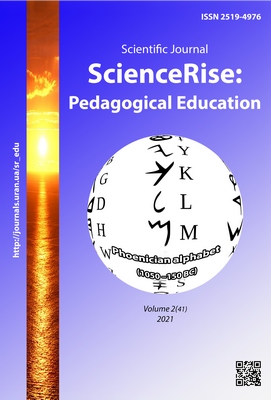The dual form of education as a component of integration processes in the educational environment
DOI:
https://doi.org/10.15587/2519-4984.2021.228241Keywords:
specialist, learning process, dual education, production, professional competency, clusterAbstract
The most important characteristic feature of the current stage of development of higher education in Ukraine is integration processes that reflect, on the one hand, substantive and structural changes within the education system, and on the other hand, the processes of interaction between education and the production sphere. The priorities of state policy and the concept of innovative development in the field of education indicate the necessity to form a wide range of mechanisms for cooperation between business and educational institutions. In the educational standard of higher education in specialty it is noted that the future specialist must be ready for the following activities: production and technological activities, project activities, research activities, organizational and management activities. Specific types of professional activity, for which a specialist is mainly prepared, are determined by higher educational institutions in cooperation with students, teachers, and employers' associations. With such an essential range of requirements for future specialists, there is a need for qualitative changes in the content and organization of training.
In modern social and economic conditions, the activities of higher education institutions that train specialists for the food industry are associated with solving a number of problems: the imperfection of the mechanisms of social partnership between educational institutions and employers; insufficient practical orientation in the training of qualified personnel for a particular enterprise; inconsistency of the educational and resource base of educational institutions. As a result of the search for effective forms of organizing of the educational process for solving the tasks set before education, the introduction of elements of dual education in the educational process seems to be expedient, promising, and of current interest
References
- Sharma, S. (2019). Democratic Values, Freedom, Control and Life Satisfaction. Economic Affairs, 64 (1), 217–231. doi: http://doi.org/10.30954/0424-2513.1.2019.26
- Imashev, G., Kuanbayeva, B., Rakhmetova, M., Uteshkaliyeva, A., Tumysheva, A., Mardanova, L. et. al. (2020). The implementation of the specialized-education model at the present stage. Ad Alta-Journal of Interdisciplinary Research, 10/01 (X), 10–13.
- Sidakova, L. V. (2016). Suschnost i osnovnye priznaki dualnoi modeli obucheniia. Obrazovanie i vospitanie, 2, 62–64.
- Vemyan, V. G., Ter-Hovhannisyan, V. G. (2015). Dual form of vocational education as a condition for effective solution of problems of modernization of education. Psychology: reality and prospects, 5, 29–34.
- Apergis, N. (2018). Education and democracy: New evidence from 161 countries. Economic Modelling, 71, 59–67. doi: http://doi.org/10.1016/j.econmod.2017.12.001
- Khomenko, V. (2016). Vyznachennia ta obgruntuvannia zahalnonaukovykh osnov rozrobky systemy dualnoho zmistu profesiinoi pidhotovky maibutnikh inzheneriv-pedahohiv. Ukrainian Journal of Educational Studies and Information Technology, 4 (2), 56–63.
- Kravchenko O., Starova T., Nykyforov R. World models of dual education and features or their functioning. AD ALTA: journal of interdisciplinary research. 2021. Vol. 11/01 (XV). Р. 87–91.
- Oleksin, Yu. P., Jakubowski, S. S. (2019). Pedagogical supervision as an element of individualization of dual training. Young Scientist, 4.1 (56.1), 102–105.
- Kulalaieva, N., Leu, S. (2019). Dual education as a tool for assurance the education of sustainable development. International Journal of Pedagogy, Innovation and New Technologies, 6 (2), 104–115. doi: http://doi.org/10.5604/01.3001.0013.6847
- Drew, C. Education for Sustainable Development, Explained! Aavailable at: https://helpfulprofessor.com/education-for-sustainable-development/
- Grigoreva, N. V., Shvets, N. A. (2016). The model of training specialists in dual-education environment. Modern problems of science and education, 6. Available at: https://science-education.ru/ru/article/view?id=25763 Last accessed: 17.03.2021
- Slozanska, H. I. (2016). Dotsilnist zastosuvannia modeliuvannia profesiinoi diialnosti u pidhotovtsi maibutnikh fakhivtsiv VNZ. Aktualni problemy humanitarnykh nauk u doslidzhenni molodykh vchenykh. Kyiv, 241–243.
- Ovsienko, L. V., Zimina, I. V., Esenina, E. Iu. (2014). Dualnoe obuchenie kak vazhnii faktor povysheniia investitsionnoi privlekatelnosti regiona. Vestnik Kazanskogo tekhnologicheskogo universiteta, 17 (5), 339–344.
- Andreitsiv, I. (2017). Shcho take dualna osvita i navishcho vona ukraintsiam. Ukrainska pravda. Available at: https://life.pravda.com.ua/society/2017/02/16/222630/ Last accessed: 21.03.2021
- Iliv, O. V. (2014). Educational complex as an object of social and geographical research. Geograficheskii vestnik, 2 (29), 15–21.
Downloads
Published
How to Cite
Issue
Section
License
Copyright (c) 2021 Olha Kravchenko

This work is licensed under a Creative Commons Attribution 4.0 International License.
Our journal abides by the Creative Commons CC BY copyright rights and permissions for open access journals.
Authors, who are published in this journal, agree to the following conditions:
1. The authors reserve the right to authorship of the work and pass the first publication right of this work to the journal under the terms of a Creative Commons CC BY, which allows others to freely distribute the published research with the obligatory reference to the authors of the original work and the first publication of the work in this journal.
2. The authors have the right to conclude separate supplement agreements that relate to non-exclusive work distribution in the form in which it has been published by the journal (for example, to upload the work to the online storage of the journal or publish it as part of a monograph), provided that the reference to the first publication of the work in this journal is included.







